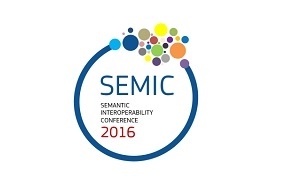Data standards for interconnected Public Administrations
Fecha de la noticia: 20-05-2016

Rome was the European city chosen to host the latest edition of the Semantic Interoperability Conference (SEMIC 2016), which took place on 12th May under the slogan "Data Standards for interconnected Public Administrations". A data standard is a specification that describes, defines and/or structures information to support interoperability, traceability and effective re-use. In this meeting, participants had the opportunity to follow discussions and panels on policies and practices for developing and using data standards and learn from the experience of standardisation organisations, governments and European institutions.
During the first part of the conference, the importance of international standards in the supply chains of the health sector was explained through a case study. The implementation of these standards would not only improve patient safety, but they could even save up to 43,000 lives a year. After this talk, it was the turn of the executive director of IJIS Institute (USA) and Kenji Hiramoto, from Japan, who explained the IMI project to enhance “semantic level” interoperability for data by creating a reference dictionary of terms that serves as an infrastructure to facilitate cooperation between systems and re-use of open data.
Afterwards, a discussion panel formed by six experts from different international organizations was held -including Patricinio Nieto, head of service at MINHAP- who shared their experiences in the practical implementation of data standards at national and international level.
The rest of the day was spent between several sessions where different topics such as the potential of economic data, legal data, the use of international standards in the financial sector or the presentation of the European CEF program, whose second call has been launched this year, were addressed. Finally, the conference ended with a roundtable where members discussed the need to create a sound open data ecosystem in Europe and presented current cases of DCAT-AP implementation.
In this regard, the next day the ISA² programme of the European Commission hosted a workshop on DCAT-AP. The workshop was organised in the context of the ISA Action 1.1 and invited implementers of DCAT-AP:
● to discuss implementation challenges and good practices;
●to learn more about the DCAT-AP implementation guidelines that Action 2.1 of the ISA2 programme is developing in collaboration with DCAT-AP implementers;
● to discover more about the status of the extensions of the DCAT-AP for geospatial and statistical data;
● to discuss about tool and software support.
Currently, ISA² program promotes horizontal and reusable data standards, which are already being implemented in operating systems in order to facilitate the data interoperability at regional, national and European level. This initiative, started this year 2016 and it will last until 2020, includes an EUR 131 million programme to support the development of interoperable digital solutions, which will be available to all interested public administrations in Europe, deleting barriers between public administrations, businesses and citizens.
The SEMIC Conference has turned into the great event of semantic interoperability at international level, and this year the meeting brought together more than two hundred professionals, not only from the public sector but researchers, consultants and representatives of international projects interested in learning and making further progress in the field of open linked data, semantic technologies, eGovernment and metadata management.











